Stories about...Summer/Academic Year Research
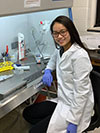 Undergraduate Women Conduct STEM Research Courtesy of Engineering’s Clare Boothe Luce Scholars Program
Undergraduate Women Conduct STEM Research Courtesy of Engineering’s Clare Boothe Luce Scholars Program
September 15, 2020
Eight undergraduate women who are committed to research and who dream of attending graduate school and possibly even pursuing careers in STEM (science, technology, engineering, and mathematics) research are discovering what it might be like courtesy of the Clare Boothe Luce (CBL) Research Scholars Program. Housed in Grainger Engineering’s Illinois Scholars Undergraduate Research (ISUR) Program, CBL provides scholarships that allow these women to experience cutting-edge research in chemistry, physics, mathematics, or engineering while being mentored by some of Illinois’ premier researchers.
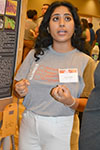 Biomedical Imaging REU Helps Undergrads Make Educated Decisions About Grad School
Biomedical Imaging REU Helps Undergrads Make Educated Decisions About Grad School
August 29, 2019
In its fifth year, the NSF-funded Biomedical Imaging REU brought ten undergraduate students from across the country, even Puerto Rico, to Illinois to expose them to the idea that studying biomedical engineering in graduate school might be a viable direction for their future. Through the REU, they discovered how rewarding research can be, gained poster-making and oral presentation skills, built relationships with peers on a similar career track, and even networked for the future.
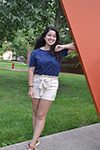 NRES Junior Alondra Estrada Passionate About Environmental Science, Research, and…Turtles!
NRES Junior Alondra Estrada Passionate About Environmental Science, Research, and…Turtles!
September 11, 2018
Growing up in Adison Illinois, Alondra Estrada, a first-generation Hispanic college student, wasn’t even sure she’d be going to college. Then she came to an Illinois summer camp and, as a result, she changed her mind about becoming a veterinarian and decided to study environmental science in Then, for the last two summers, she participated in the WE CAN which further muddied the waters regarding her next step career wise. Should she become an animal photographer, go to grad school and become an environmental scientist, or, go for her dream job, an environmental lawyer? While she isn’t sure what the future holds, she does know this: her many experiences have given her a lot of great career options.
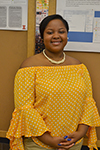 SPIN Introduces Shelana Martin to Cybersecurity and the Open Source Platform, Moodle
SPIN Introduces Shelana Martin to Cybersecurity and the Open Source Platform, Moodle
September 4, 2018
How did Shelana Martin, who’s not a computer science major, end up in an NCSA internship? The rising senior in education technology under the College of Education’s Learning and Education Studies program was part of NCSA’s SPIN (Students Pushing Innovation) internship program. SPIN fosters interdisciplinary collaboration, encouraging Illinois undergraduate students, and not just computer science students, to do challenging research related to cutting-edge new technology. The new technology Martin learned was Moodle, an open-source learning management system. Plus she also learned quite a bit about cybersecurity too.
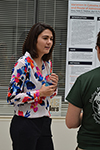 Vet Med Students Experience Veterinary Research During Summer Research Training Program
Vet Med Students Experience Veterinary Research During Summer Research Training Program
August 23, 2018
Nineteen Vet Med students participated in the College of Veterinary Medicine’s Summer Research Training Program (SRTP) this past summer. They not only conducted research, but made a poster and had a chance to present it at a number of venues. According to the director, Lois Hoyer, SRTP is intended to be a pipeline into veterinary research. Its goal is “to identify the students who have a potential interest in a research-focused career or a career that has some research component to it, and then start them out early.” Because many SRTP students are just finishing their first year of the veterinary program, they can find another research opportunity next summer to continue to build their research credentials.
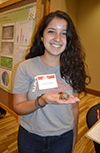 Illinois Summer Research Symposium Showcases Undergraduates’ REU Experiences
Illinois Summer Research Symposium Showcases Undergraduates’ REU Experiences
August 14, 2018
On July 19–20, 2018, over 150 undergraduate students and pre-doctoral students presented posters at the 2018 Illinois Summer Research Symposium (ISRS) as a culmination of their summer research experiences at Illinois. The students not only conducted studies in the labs of some of Illinois’ world-renowned researchers, but many of them were part of undergraduate programs that also partnered with SROP, the Graduate College’s Summer Research Opportunities Program. This allowed the undergrads to participate in professional development activities, many of them in preparation for possibly continuing their education and research in graduate school, and also provided the students networking opportunities.
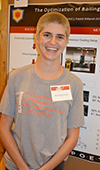 POETS REU Fosters Innovative Thinking to Change the Future of Power Dense Electronic Systems
POETS REU Fosters Innovative Thinking to Change the Future of Power Dense Electronic Systems
August 15, 2018
Ever wonder what the future of electronics could look like—say over the next decade? As part of the POETS (Power Optimization of Electro-Thermal Systems) ERC's 10-week, NSF-funded Research Experience for Undergraduates (REU), 15 students were able to explore the possibilities through authentic research experiences. Additionally, the students were exposed to a variety of educational programs that not only enhanced their knowledge base, and supplemented their research, but also exposed them to and prepared them for STEM careers.
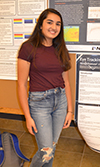 Undergrads Experience Open Source Software & Interdisciplinary Research Via INCLUSION REU
Undergrads Experience Open Source Software & Interdisciplinary Research Via INCLUSION REU
August 13, 2018
Twelve undergraduate students participated in the second summer of NCSA’s NSF-funded INCLUSION (Incubating a New Community of Leaders Using Software, Inclusion, Innovation, Interdisciplinary and OpeN-Science) REU (Research Experience for Undergraduates). Students gained skills they hope employ down the road, including coding in a new programming language and using Open Source Software. Plus, they got the chance to prepare a poster and present their research at the July 25th end-of-the-summer Poster Session at the NCSA (National Center for Supercomputing Applications). Participants also made some new relationships.
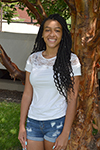 Undergrad Brione Griffin Gets One Step Closer to Her Dream of Becoming a Doctor Via REACH RCEU
Undergrad Brione Griffin Gets One Step Closer to Her Dream of Becoming a Doctor Via REACH RCEU
July 25, 2018
Brione Griffin’s career goals have always been “to be a doctor—be a doctor and help people out.” So when she learned about REACH (Research and Education for the Advancement of Compassionate Health Care) RCEU (a Research Experience for Undergraduates with an added clinical component), sponsored and funded by the new Carle Illinois College of Medicine, she was intrigued. "I think it's something I've loved all my life,” Griffin says regarding her passion for science, biology, and medicine. She shares an anecdote about how she got interested in those.
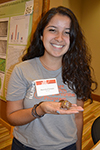 WE CAN REU Provides Minority Students an International Experience, Research at the Intersection of Engineering and Agriculture
WE CAN REU Provides Minority Students an International Experience, Research at the Intersection of Engineering and Agriculture
July 20, 2018
The six minority undergraduate students who participated in the USDA-funded WE CAN (Wildlife Engineers Co-managing Agriculture in Nature) REU (Research Experience for Undergraduates), spent the summer of 2018 learning what conducting research is like. However, because We CAN is a two-summer program, this summer’s research opportunity followed on the heels of last summer’s 4-week trip to South Africa where participants collaborated with South African students to do ag-related engineering projects. According to Agricultural and Biological Engineering Assistant Professor Paul Davidson, the focus of WE CAN was to recruit underrepresented minorities and train them for careers in agriculture. Of the six WE CAN fellows, three are African American, and three are Hispanic. And it just so happens that all six are female. “That wasn’t on purpose,” Co-PI Michelle Green, a Research Assistant Professor in Animal Sciences, qualifies, “but they were our best matches for the program.”
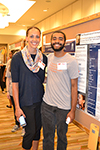 Underrepresented Minority Undergraduate Students Gain Research, Clinical Experience Via the Carle Illinois College of Medicine’s New REACH RCEU
Underrepresented Minority Undergraduate Students Gain Research, Clinical Experience Via the Carle Illinois College of Medicine’s New REACH RCEU
July 19, 2018
There’s a new RCEU in town, REACH (Research and Education for the Advancement of Compassionate Health Care), sponsored and funded by the new Carle Illinois College of Medicine. What’s an RCEU? It’s an REU (a Research Experience for Undergraduates) with a clinical component in addition to the research. The REACH participants not only gained research and clinical exposure, but a better understanding of the breadth and interdisciplinary nature of the health care system, and research that impacts it.
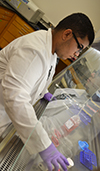 REACH Program’s Emphasis of Research Plus Clinical Confirms Alexis Chamorro Ortiz’s Career Goals: To Both Treat and Research Cancer
REACH Program’s Emphasis of Research Plus Clinical Confirms Alexis Chamorro Ortiz’s Career Goals: To Both Treat and Research Cancer
July 18, 2018
Alexis Chamorro Ortiz didn’t just wake up one morning and decide he wanted to spend the summer after his sophomore year at the University of Puerto Rico doing cancer research at Illinois as part of the REACH (Research and Education for the Advancement of Compassionate Health Care), a new USDA-funded RCEU (Research Experience for Undergraduates with an added clinical component). For most of his childhood, he had watched his grandfather first overcome a brain tumor, then lose his battle with brain cancer when Ortiz was a freshman in high school. “He passed away so quickly, and it made me want to help other people who are like my grandpa,” Ortiz explains.
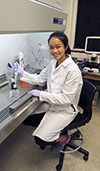 ResearcHStart Promotes the Next Generation of Scientists by Exposing Local High School Students to Cancer Research
ResearcHStart Promotes the Next Generation of Scientists by Exposing Local High School Students to Cancer Research
May 9, 2018
When the American Cancer Society discontinued its program exposing high school students to cancer research in laboratories, philanthropists Deborah and Ira Cohen, he's an Illinois CS alumni and she's a huge advocate for cancer research, said to each other: “I wonder if we could do something about that?” So they did. In 2015, they began researcHStart, a program which allows Illinois high school students to discover what a career in cancer research might be like via authentic research experiences in cutting-edge laboratories at Illinois and other campuses in the state.
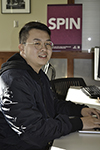 NCSA’s SPIN Program Exposes Illinois Students to Innovative, High-Tech Research
NCSA’s SPIN Program Exposes Illinois Students to Innovative, High-Tech Research
November 30, 2017
Illinois undergraduate students seeking to do challenging research on campus, especially related to cutting-edge new technology, need look no further than NCSA’s SPIN (Students Pushing Innovation) program. Begun in 2012, it was created to support undergraduate research on campus and also to provide access to new technology—high-performance computing, data analysis and visualization, or cybersecurity, to name several. The gist of the program? Students get to do cutting-edge research in new technologies mentored by world-class researchers— possibly using NCSA’s Blue Waters supercomputer.
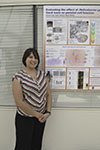 Vet Med’s Summer Research Training Program Exposes Participants to What Careers in Veterinary Research Might Entail
Vet Med’s Summer Research Training Program Exposes Participants to What Careers in Veterinary Research Might Entail
October 31, 2017
Every year since 2003, the Summer Research Training Program (SRTP) has hosted 14–25 veterinary school students from the University of Illinois to conduct a research project for 10 weeks over the summer. The goal of the program? To facilitate the career progression of veterinary medicine students who have the ability and motivation to become research scientists. Each of the 14 participants who participated was paired with a mentor from the Illinois College of Veterinary Medicine and helped design a research project, which they participated in from beginning to end. In addition to research, they also explored future available careers, trained in research ethics, and learned about proper scientific writing. Run by Professor Lois Hoyer, the SRTP lasted from May 22nd to July 28th.
 nano@Illinois RET Teachers Experience Cutting-Edge Nanotechnology Research—Introduce It to Their Students
nano@Illinois RET Teachers Experience Cutting-Edge Nanotechnology Research—Introduce It to Their Students
September 18, 2017
In its fourth and final year, the nano@illinois Research Experience for Teachers (RET), funded by the National Science Foundation, offered eleven P–20 STEM teachers the opportunity to do cutting-edge research in the field of nanotechnology under some of Illinois’ premier researchers in the field. The second emphasis of the RET was for teachers to develop modules related to their research that could be used in their own and other classrooms. The goal of the RET is that, based on teachers’ resulting enthusiasm, content knowledge, and increased familiarity with possible careers in the field, along with the modules they develop, which will be available for use by other teachers as well, a larger number of students will be exposed to the field.
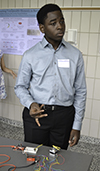 POETS’ Education Program Introduces Students of All Ages to Interdisciplinary Research in Electro-Thermal Systems
POETS’ Education Program Introduces Students of All Ages to Interdisciplinary Research in Electro-Thermal Systems
August 31, 2017
In addition to cutting-edge research in electro-thermal systems, the NSF-funded POETS (Power Optimization for Electro-Thermal Systems) Engineering Research Center has educational programs that expose students (as well as the teachers) to POETS’ research via educational activities, research, and courses that foster interdisciplinary collaboration and expose learners to the unique research that takes place in the Center.
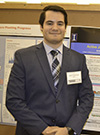 POETS’ REU Exposes Undergrad Students to Electro-Thermal Systems Research
POETS’ REU Exposes Undergrad Students to Electro-Thermal Systems Research
August 21, 2017
Ever notice how much heat your electronic devices give off? Four undergraduate students had an opportunity this summer to not only learn about this issue, but possibly help do something about it as part of the 10-week REU (Research Experience for Undergraduates) sponsored by the POETS (Power Optimization for Electro-Thermal Systems) Engineering Research Center.
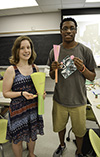 Young Scholars Program Exposes Local High School Students to Research, the University
Young Scholars Program Exposes Local High School Students to Research, the University
August 2, 2017
Instead of spending their summers working at McDonalds, or lounging by the pool, twelve rising juniors and seniors from Centennial and Central High Schools in Champaign spent the summer learning about things like photon quantum mechanics, dark matter detectors, and the biochemistry of swimming bacteria. Part of the Young Scholars Program, a new, six-week summer research opportunity, the students got to experience authentic, cutting-edge research in some of Illinois' premier research labs. Begun by the Nuclear Physics Laboratory in the Physics Department, who joined forces with the POETS Engineering Research Center to broaden and strengthen the program, Young Scholars received funding from multiple sources: ICR funds from the NSF NPL grant, the NSF-funded POETS, the Physics Department itself, and the College of Engineering (which provided funding for one student). The fledgling program was begun to help students discover what research is actually like, determine if research might be in their futures, plus give them an idea of what college is like.
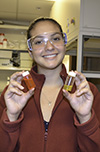 Bioimaging REU Exposes Undergrads to Imaging Research, What Grad School is Like
Bioimaging REU Exposes Undergrads to Imaging Research, What Grad School is Like
July 18, 2017
In its third summer, the Bioimaging Research Experience for Undergraduates (REU) allowed four undergraduate students to experience research on imaging. Not only did they learn about the specific area they were researching; but they acquired new skills related to imaging; gained professional skills, such as how to present their research; plus learned what graduate school is like. For some, it confirmed that graduate school/research was in their future.
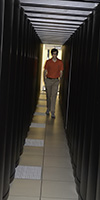 At Blue Waters Institute, Students Use Parallel Computing, Super Computers, to Speed Up Research
At Blue Waters Institute, Students Use Parallel Computing, Super Computers, to Speed Up Research
June 28, 2017
With the goal of learning High-Performance Computing (HPC), 26 students were on campus from May 29th through June 9th as part of the 2017 Blue Waters Institute. While some were graduate students from the XSEDE project, 18 were undergraduate Blue Waters Interns. Not only did these interns spend two weeks learning about parallel computing, but over the next year, they will continue to use their newly acquired HPC skills—and the Blue Waters Super Computer—to analyze data for their Blue Waters research projects back at their home institutions.
FULL STORY
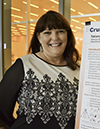 nano@illinois RET's Tatiana Stine Hopes to Help Expose Youngsters to Nanotechnology
nano@illinois RET's Tatiana Stine Hopes to Help Expose Youngsters to Nanotechnology
September 5, 2016
An instructional coach at a local school, Tatiana Stine is passionate about helping her teachers implement the Next Generation Science Standards—especially engineering. A participant in the nano@illinois RET program this past summer, she got to work with innovative nanotechnology while conducting research on graphene. And she not only learned a lot of new things, she developed teaching modules she plans to take back to her teachers. And one day, while waiting for gold nanoparticles to deposit on her device, she came up with a fun and novel way to teach youngsters about nanotechology—Gene the Graphene.
FULL STORY
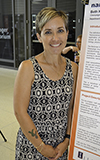 nano@illinois RET Teachers Discover Nanotechnology's Big Impact—Hope Their Students Will Too
nano@illinois RET Teachers Discover Nanotechnology's Big Impact—Hope Their Students Will Too
August 31, 2016
If you get them hooked early, the kids will think graphene is so cool, and that spark could make them the next big nano scientist.” – Tatiana Stine
This summer 11 teachers of varying grade levels and backgrounds participated in the nano@illinois Research Experience for Teachers (RET) funded by the National Science Foundation. While participating in research in a wide range of areas, these teachers’ eyes were opened to the intricate world of nanotechnology and all the possibilities it offers. But while the research is important, that’s not the program's only goal. It is expected that these teachers will then take all that they learned through their research on nanotechnology and, with support from staff and other teachers, translate it into lesson modules they can use with their students back home. It is hoped that as they are able to successfully teach their students what they’ve learned, they’ll not only be exposing them to STEM, but some of its cutting-edge possibilities, like nanotechnology, that their students may never been exposed to before because of a variety of factors, including their socioeconomic background.
FULL STORY
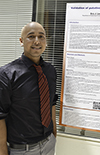 Vet Med Students Gain Knowledge, Skills During Summer Research Training Program
Vet Med Students Gain Knowledge, Skills During Summer Research Training Program
August 24, 2016
This past summer, 14 Illinois Veterinary Medicine (Vet Med) students participated in the 2016 College of Veterinary Medicine Summer Research Training Program, which provided students a chance to get hands-on research experience in their prospective fields and also gave many of them a better idea of what they want to pursue regarding their future careers. Over the course of the summer (May 23–July 29, 2016), participants not only learned a great deal about the area they were researching, developed new skills and techniques which will be beneficial both in their college and professional careers, but grew personally as well.
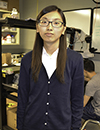 POETS REU Helps Illinois Undergrad Sabrina Yin Choose Her Career Path
POETS REU Helps Illinois Undergrad Sabrina Yin Choose Her Career Path
August 22, 2016
Most REU (Research Experience for Undergraduates) participants have an opportunity to conduct research for 8–10 weeks during the summer. Their experience then culminates in a poster session—the highlight of the summer—which gives the undergrad the chance to hone his or her skills while creating a research poster and reporting results. However, POETS REU participant Sabrina Yin, a rising junior majoring in Mechanical Engineering at Illinois, is doing more than just a couple of months worth of research in the summer. Yin began working in researcher Nenad Miljkovic’s Energy Transport Research Lab in March, participated in the REU this summer, and will continue her research in the lab this fall and beyond. “This research project that I’m working on will run for another two years approximately. So I’ll be staying in the lab to help out with the research,” she explains.
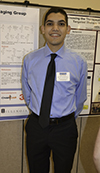 2016 Chemistry REU Offers Undergraduate Students a Glimpse of Grad Life
2016 Chemistry REU Offers Undergraduate Students a Glimpse of Grad Life
August 16, 2016
This summer at Illinois, five undergraduate students were chosen to be a part of the Chemistry REU (Research Experience for Undergraduates) program to get a glimpse of what research in graduate school looks like. Allison Fout, the PI for this REU, which currently is solely funded by 3M, said that out of 270 applicants, only five were chosen. According to Fout, applicants were selected based upon the following criteria: “Their grades, their letters of recommendation, their experience. (You could really gain experience by coming here)" she adds. Plus, she indicates that the final criteria was: "students that were interested in pursuing chemistry in the future. All of those things were part of what we were looking at.”
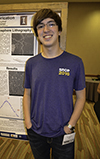 Undergrads Consider Nanotechnology Careers Thanks to nano@illinois REU
Undergrads Consider Nanotechnology Careers Thanks to nano@illinois REU
August 10, 2016
During the summer of 2016, ten undergraduate students learned about nanotechnology as part of the NSF-funded nano@illinois Research Experience for Undergraduates (REU). While spending the summer performing research in the labs of some of Illinois’ premier researchers, the students not only learned a lot about the area in nanotechnology that they were studying; they learned what grad school is like and got some pointers on how to apply. Finally, many of them discovered that they liked research…a lot. In fact, some even decided that the area they researched over the summer was the area they wanted to concentrate on in the future.
FULL STORY
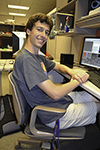 Bioimaging REU's Matt Kavanaugh Experiences Cancer Research at Illinois
Bioimaging REU's Matt Kavanaugh Experiences Cancer Research at Illinois
July 29, 2016
Matt Kavanaugh had originally applied to Illinois as an undergraduate, but finances prevented him from coming here. So he matriculated to the University of Kansas, where the rising junior is majoring in Chemical Engineering with a concentration in Biomedical. However, when searching for something productive to do over the summer, he came across the NSF-funded Bioimaging Research Experience for Undergraduates (REU) at Illinois.
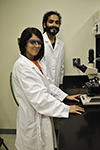 Undergrads in Bioimaging REU Experience What Research, Graduate School Is Like
Undergrads in Bioimaging REU Experience What Research, Graduate School Is Like
July 29, 2016
Ten undergraduate students from around the country participated in the NSF-funded Bioimaging Research Experience for Undergraduates (REU). Working alongside researchers in Illinois labs, they discovered the exciting world of bioimaging research, got a taste of what graduate school is like, and some might have discovered what they want to do for the rest of their lives.
 Wendy Reyes Learns Life Skills in Bioimaging REU
Wendy Reyes Learns Life Skills in Bioimaging REU
July 29, 2016
When rising junior Wendy Reyes spent the summer doing research in Professor Michael Insana’s Ultrasonic Imaging Lab as part of the 2016 Bioimaging REU, she learned a lot.She learned some research skills: how to train software to recognize cancer in the images of breast tissue.
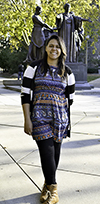 Rodriguez-Otero Says SROP Puts a Face With an Application, Fosters Relationships
Rodriguez-Otero Says SROP Puts a Face With an Application, Fosters Relationships
November 10, 2015
So how did Molecular and Cellular Biology (MCB) grad student Jannette Rodriguez-Otero from San Juan, Puerto Rico, go from studying to be a barber in a local vocational school to working on a Ph.D. in molecular sciences in MCB's Cellular Developmental Biology Department? She claims that there’s one reason she’s at Illinois: SROP.
FULL STORY
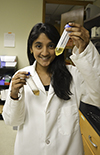 nano@illinois REU Undergrads Experience Growth Via Nanotechnology Research
nano@illinois REU Undergrads Experience Growth Via Nanotechnology Research
August 27, 2015
"I definitely think the best learning experiences are those that push you out of your comfort zone." – Rumya Raghavan
Eleven undergraduate students spent the summer working in the labs of some of Illinois' world-class researchers as part of the 10-week nano@illinois REU (Research Experience for Undergraduates). Not only did participants perform nanotechnology research, but they were challenged both professionally and personally as they learned new things about nanotechnology, about life in a research lab, and about themselves. As a result of their experience, some decided that graduate school might be in their future; some even considering careers in nanotechnology research.
FULL STORY
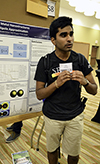 REU Undergrads Experience Research, What Graduate School Is Like
REU Undergrads Experience Research, What Graduate School Is Like
August 25, 2015
Twenty-six undergrads helped with cutting-edge research at Illinois this past summer as part of three NSF-funded Research Experience for Undergraduates (REU) programs: the nano@illinois, EBICS, and Bioimaging REUs. In addition to the research experience itself, as a side benefit, participants got to find out what being a graduate student is like and possibly decide if research—particularly the area they were studying this summer—might be the career for them.
FULL STORY
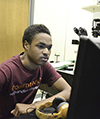 2015 EBICS REU Introduces Undergrads to the World of Research, Graduate School
2015 EBICS REU Introduces Undergrads to the World of Research, Graduate School
August 25, 2015
While performing cutting-edge research at Illinois this past summer as part of the NSF-funded EBICS (Emergent Behaviors of Integrated Celllular Systems) Research Experience for Undergraduates (REU), the five students gained more than a deeper understanding of the subject they were studying; they learned time management, networked with researchers, and experienced what it's like to be graduate students.
FULL STORY
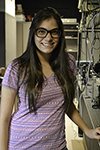 Summer Research Experience Exposes Undergrads to Bioimaging at Illinois
Summer Research Experience Exposes Undergrads to Bioimaging at Illinois
August 24, 2015
One goal of the NSF-funded Bioengineering REU (Research Experience for Undergraduates) was that students who participated this summer would consider going to graduate school, and hopefully in bioimaging—and it appears they might have achieved that goal. The ten undergrads who participated in the REU not only performed cutting-edge bioimaging research; they also found out what grad school is like, and some even decided that the area they researched this summer might be the career for them—and that Illinois is the place to prepare for it.
FULL STORY
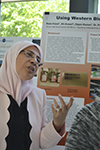 RET Teachers Experience Multidisciplinary Nanotechnology Research via nano@illinois
RET Teachers Experience Multidisciplinary Nanotechnology Research via nano@illinois
August 3, 2015
When the twelve P-20 STEM teachers participating in this summer’s iteration of nano@illinois Research Experience for Teachers (RET) arrived on campus to do research in some of Illinois’ state-of-the-art labs under some of Illinois’ premier researchers, they learned a whole lot about their research topics. And while learning about converting 3D files to DNA brick objects, or receptor differences in cancer cells, or graphene, or that micro cavities can trap light between mirrors, they discovered one overarching fact about nanotechnology research at Illinois: it isn’t all housed in one particular department. While nanotechnology is about things that are really, really small, nanotechnology research on campus is really big and is spread out across numerous disciplines.
FULL STORY
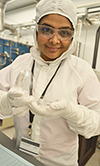 2015 nano@illinois RET Teachers Perform Nanotechnology Research, Make Modules
2015 nano@illinois RET Teachers Perform Nanotechnology Research, Make Modules
August 3, 2015
Funded by the National Science Foundation, the nano@illinois Research Experience for Teachers (RET) offered eleven practicing P-20 STEM teachers and one pre-service teacher the chance to do research under some of Illinois’ premier researchers in their state-of-the-art labs. Over the next year, teachers are then to develop a module related to their nanotechnology research that can be used in their own or other classrooms. According to Program Coordinator Carrie Kouadio, the RET's main goal is “that the students will be impacted and can benefit from the teacher's increased enthusiasm, higher content knowledge, and ability to direct them in considering careers.”
FULL STORY
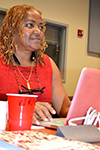 Petascale Institute Introduces Students to High-Performance Computing
Petascale Institute Introduces Students to High-Performance Computing
June 12, 2015
Most of the 34 students who attended the two-week Petascale Institute May 24th–June 5th are not in computer science; however, by the middle of the second week, they were glibly rattling off HPC (High Performance Computing) jargon, confidently referring to concepts most of us have either never heard of or have no idea what they actually are, like: OpenMP and MPI, vector accelerators, OpenACC, CUDA, debugging, optimization, and visualization. Their goal? To learn enough about parallel computing to be able to use Blue Waters or another supercomputer to analyze data for projects ranging from studying black holes, neutron stars, and galaxies, to natural language acquisition, visualization in cyber security, or protein folding using molecular dynamic simulations.
FULL STORY
 Local Biology Teacher to Introduce her Students to Research on Quantum Dots
Local Biology Teacher to Introduce her Students to Research on Quantum Dots
July 10, 2014
“I teach in a very small school with limited resources," says science teacher Aubrey Wachtel, "so one of the best things that I can do is have experiences and then bring them back to the classroom." So this summer, Wachtel is experiencing nanotechnlogy while researching quantum dots."
FULL STORY
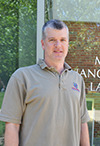 Local Science Teachers Experience Research in NanoTechnology
Local Science Teachers Experience Research in NanoTechnology
July 9, 2014
For the next three years, a number of area science teachers will have an opportunity to participate in the Nano@illinois RET, where they will not only learn about, but actually participate in, cutting edge research in nanotechnology and even adapt some of what they have learned for students in their classrooms.
FULL STORY
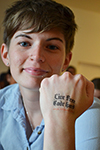 Interns Have an Up-Close-and-Personal Encounter With Blue Waters
Interns Have an Up-Close-and-Personal Encounter With Blue Waters
June 24, 2014
Ever want to take a super-computer for a spin? Students from around the country who participate in the Blue Waters Student Internship Program recently got to do just that. After learning about parallel programming—the language of supercomputers—the interns being exposed to HPC (High-Performance Computing) got to run their program on the University of Illinois' Blue Waters, one of the most powerful supercomputers in the world and the fastest on a university campus.
FULL STORY
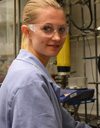 Chemistry REU Increases Likelihood That Students Choose STEM/Research Careers
Chemistry REU Increases Likelihood That Students Choose STEM/Research Careers
August 30, 2013
Fourteen young researchers from all over the U.S. were on campus this summer participating in a 10-week Chemistry REU program (Research Experience for Undergraduates) funded by the National Science Foundation. These undergrads experienced firsthand what research in chemistry is like at a world-class university— and what being a grad student might be like.
FULL STORY
 EBICS REU Students Experience Research on Biological Machines
EBICS REU Students Experience Research on Biological Machines
August 29, 2013
Not too long ago, the five undergrad students who spent the summer in Illinois labs could only have encountered biological machines in one place—straight out of Sci-Fi. But as part of EBICS' (Emergent Behavior of Integrated Cellular Systems) Research Experience for Undergraduates (REU) program, these students got to conduct research in ground-breaking new areas like biological machines and biomedical engineering.
FULL STORY
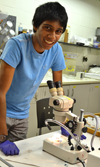 I-STEM Program Gives Local High Schoolers Research Experience at Illinois
I-STEM Program Gives Local High Schoolers Research Experience at Illinois
July 11, 2013
Instead of tanning in the sun and playing video games all day, a group of high school students chose to devote part of their summer vacation to research in Illinois labs.
This summer 24 students from University Laboratory High School participated in the third annual I-STEM High School Research Experience...
FULL STORY
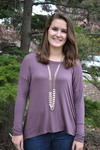 EBICS Offers High Schoolers Research at the Intersection of Biology & Engineering
EBICS Offers High Schoolers Research at the Intersection of Biology & Engineering
November 27, 2012
In summer 2012, three high school students had the opportunity to participate in authentic summer research opportunities at the intersection of biology and engineering. Sponsored by EBICS (Emergent Behaviors of Integrated Cellular Systems), these students participated in its High School Research Program, which seeks to increase the number of students who choose careers in the discipline by exposing high school students (especially those underrepresented in STEM fields) to research opportunities in the new discipline.
FULL STORY
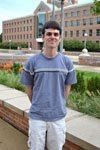 EBICS REU Student Contributes to Research on Neuron Cells
EBICS REU Student Contributes to Research on Neuron Cells
September 27, 2012
Rather than lazing the summer away like some of his peers, Ryan Tapping, an Illinois undergraduate student, spent his productively—making a significant contribution to research. The experiment? Studying how neuron cells from a rat brain form clusters.
Participating in the National Science Foundation's (NSF) Research Experience for Undergraduates (REU) program, Tapping worked with faculty member Martha Gillette, who is part of EBICS (Emergent Behaviors of Integrated Cellular Systems)...
FULL STORY
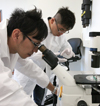 B3 Summer Institute Provides Interdisciplinary Training
B3 Summer Institute Provides Interdisciplinary Training
August 28, 2012
"So it's a good two-week, very intense, but very "get-your-feet-wet" sort of experience. The speaker list is phenomenal... You name the campus, and you've got all the big leagues from anywhere, from this campus and other campuses all over." Irfan Ahmad
Nicknamed B3SI by the planners, the two-week-long BioSensing BioActuation BioNanotechnology Summer Institute 2012, held at the Micro and Nanotechnology Laboratory (MNTL) from July 30–August 10, 2012, was intended to train participants at the intersection of biology and engineering and to foster networking with other researchers...
FULL STORY
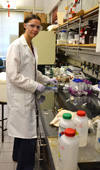 Summer Research Experiences Steer Undergrads Toward STEM Careers
Summer Research Experiences Steer Undergrads Toward STEM Careers
July 27, 2012
Instead of lounging by the pool this summer, a number of undergraduate students have been in Illinois labs—not only conducting research—but possibly figuring out what they want to do for the rest of their lives.
Participants in the National Science Foundation's Research Experience for Undergraduates (REU) program, these students are experiencing what real research is like. For many of them, this experience has also exposed them to what graduate school is like. For others...
FULL STORY
 High Schoolers Gain Authentic Research Experience at Illinois
High Schoolers Gain Authentic Research Experience at Illinois
July 9, 2012
For some students, participating in this summer's I-STEM High School Summer Research Experience confirmed their inclination to pursue a career in a specific STEM field. For others, STEM is now a viable career option. For others still, it convinced them that the field in which they conducted research is the last field they would ever consider for a career. Every student came out with a better understanding of STEM. Just as intended.
FULL STORY
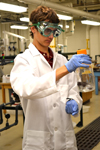 High School Student Experiences Life in an Illinois Lab
High School Student Experiences Life in an Illinois Lab
July 2, 2012
Nathan Beauchamp jangles the key from his pocket, unlocks the double door and reaches towards the four light switches wrapped around the adjacent wall. The 15-year-old flips the lights with the blind cool only muscle memory can foster. The Unit Operations Lab in the basement of Roger Adams Laboratory at the University of Illinois bursts awake.
Beauchamp is tired today—he stayed up late completing a poster he will present on Friday while explaining his research in the field of 3D printing—and walks to his computer more laboriously than usual.
FULL STORY
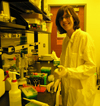 Uni High Students Experience
Uni High Students Experience
Cutting-Edge Research at Illinois
July 11, 2012
On the northeastern edge of campus, University Laboratory High school’s proximity to Illinois’ myriad research facilities made it an ideal partner for I-STEM’s pilot project offering summer research opportunities to high school students. Of the 50 or so students who applied, 19 were chosen on the basis of both their performance in science and math and of their application, which included an essay on their interest in science and how participating would prepare them for a possible career in science.
STORY
 OLLI Offers Mature Adults Learning and Research Opportunities
OLLI Offers Mature Adults Learning and Research Opportunities
February 12, 2012
Unlike some senior adults who, after retiring from full-time jobs also retire from learning, a group of local retirees are continuing to learn—not only in the classroom—but in some more unusual places: Illinois' research labs. These seniors are participants in the OLLI Scientist Program, sponsored by Illinois' Osher Lifelong Learning Institute, more commonly referred to simply as OLLI, which is a program of learning opportunities for adults age 50 or older. These opportunities range from classes offered on campus to lab work, a lecture series, and overseas travel.
STORY
 Chemistry Receives Funding to Improve Services to Undergraduate Students
Chemistry Receives Funding to Improve Services to Undergraduate Students
Get students interested in chemistry! While the goal of Chemistry at Illinois may be simply stated, to achieve it, the Department has taken on a task that is not so simple: to design and implement a new undergraduate chemistry curriculum. Besides fostering student interest in chemistry, the Department hopes to give students a solid foundation in chemical competencies, attract under-represented students to STEM majors, and provide students in introductory chemistry with a knowledge of chemical research problems.
STORY
 ITI in first year of NSF grant as "Research Experiences for Undergraduates" (REU) Site
ITI in first year of NSF grant as "Research Experiences for Undergraduates" (REU) Site
October 15, 2009
The Information Trust Institute (ITI) at the University of Illinois at Urbana-Champaign has received a $357,000 award from the National Science Foundation (NSF) to create a “Research Experiences for Undergraduates” (REU) site.
STORY
 Illinois Ag student Tristesse Jones is STEM education success story
Illinois Ag student Tristesse Jones is STEM education success story
December 9, 2009
Tristesse Jones, a senior majoring in crop sciences and preparing to be a research biologist, followed the STEM education pipeline to the University of Illinois.
STORY













.jpg)
















